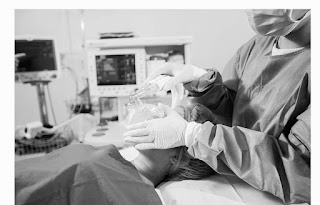There are currently no licensed pharmacological therapies for ARDS, although there are a number of novel agents under development.
Appropriate treatment of risk factors including pneumonia, non-pulmonary sepsis (e.g. peritonitis), aspiration of gastric contents, major trauma, transfusion, and acute pancreatitis.
Protective mechanical ventilation using tidal volumes of 6 mL/kg predicted body weight (PBW), and a plateau pressure less than 30 cmH2O, confers a mortality benefit, and should be undertaken whenever possible
Extracorporeal membrane oxygenation & extracorporeal carbon dioxide removal have not been proved to be of universal benefit in ARDS, although it is possible that there may be sub-populations of ARDS patients (e.g.H1N1 influenza patients and ECMO ) that derive benefit from these interventions.
Fluid restriction, after patients are appropriately resuscitated, is probably of benefit.
There is no evidence to support a specific feeding regimen in ARDS patients. Adding parenteral nutrition to enteral nutrition, to facilitate the early meeting of caloric goals, may be detrimental in critically-ill patients.
Cisatracurium therapy. Paralysis was commenced within 48 hours, and was continued for 48 hours according to a standardized protocol.
Several studies have shown no benefit from the use of high-dose short-course corticosteroids. However, interest remains in the use of low-dose corticosteroids for established ARDS.
Routine use of beta-adrenergic receptor agonists in ARDS patients cannot be recommended.
Multicentre RCT of large volume natural porcine surfactant replacement, within 36 hours of the onset of ARDS, showed no benefit and a trend towards increased mortality and adverse events.
Preclinical studies have suggested that using interferon beta to induce CD73, a cell surface enzyme that de-phosphorylates AMP to adenosine, may be of benefit in ARDS by improving endothelial barrier function.
Preclinical studies show that platelet inhibition with aspirin leads to improved outcomes in animal models of ARDS.
Clinical trial to investigate the role of
allogeneic bone marrow-derived mesenchymal stem cells (MSCs) for the treatment of ARDS is currently underway.



